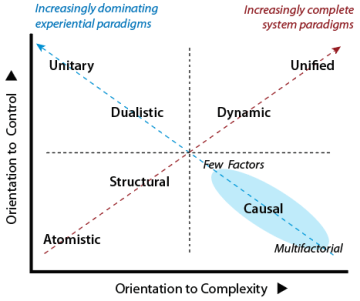A Puzzling Omission
What's in a Name?
This analysis identified 7 distinct depiction paradigms.
The paradigms are biologically-based conceptual intermediaries between ourselves and the realities that have to be handled, managed, modified or otherwise dealt with. Reality in this case is referred to abstractly as an entity or more concretely as a situation.
The properties and handling of any entity-situation are determined by the paradigm in use.
The approach duality, found via diagonals on a TET, are not complete opposites, but rather distinct and complementary forms of being. Paradigms on the lower-left to upper-right diagonal view entity-situations as bounded structures. The conventional scientific term here is "system", and the 4 paradigms produce 4 recognizable types.![]() Detail
Detail
The remaining 3 paradigms on the lower-right to upper-left diagonal view entity-situations as unstructured with a focus on one element, two elements or an undefined multiplicity of elements. These three are characterized as experiential in the sense that each emerges easily or even spontaneously during endeavours by creating meaning, resolving confusion, and generating consensus. Most significantly, they activate dominating and controlling behaviours.
Q: What conventional label (i.e. term, name, concept) is available for this class of unstructured goal-seeking depictions and corresponding phenomena?
A: There is none—which is a puzzle.
Solving the Puzzle
Each of the three experiential paradigms——are readily recognizable and each has often been described in one way or another. Although these depictions can be naturally combined to form a class of "unstructured experiential wholes", this class does not appear to have been formalized, and so lacks a name.
I have a rule against creating neologisms because I depend on observations and names used by far more profound thinkers, practitioners and scientists. The absence of a class name despite unequivocal recognition over millennia of these experiential paradigms is a new and surprising finding.
The absence of a term cannot be dismissed as a mistake or simple oversight—it should be viewed as a symptom of a historical and philosophical bias.
At present no-one seems to experience a need to remedy this blind-spot by providing a name to cover this class of functioning and phenomena. Even social scientists who are particularly aware of political ideologies, polarized social conflicts, and the use of power to control explanations, do not penetrate these realities to grasp the depiction paradigms in use.
Just Puzzling or Really Serious?

If something is not named, then it cannot be manipulated in thought and that means it cannot be managed effectively in practice ... only endured. Looking around at societies and civilizations, the persistence of repetitive cycles of social failures and unnecessary suffering should be a concern for all.
Why have thinkers and scientists failed to develop solutions? Could this blind-spot in regard to experiential paradigms be contributing to that failure?
The unstructured experiential paradigms are all distinguished and defined by domination and the urge for power rather than efficacy. They avoid the genuine complexity of social life, and the essence of humanity in personal autonomy and responsibility.
These experiential paradigms serve totalizing functions. Their manifestations revel in control, coercion, polarization, conformity, herd-mentality, denial and even mindlessness. Intellectual study is lacking and each paradigm, in their own way, opposes ruthless dispassionate study from within.
Because these paradigms are used without awareness of their underlying nature, discourse is weakened or even hijacked—either producing rigid views masquerading as reason or impeding a proper account of horrors that are being justified.
Conclusion
The identification of the has forcibly formalized representational freedom in a way that epistemology, systems theory, and philosophy have mostly elided.
Standard system science is not equipped to recognize the dual architecture of awareness because it assumes that everything is a system, while conventional thinking, supported by the controlling forces that surround them, steers away from formalizing a large part of the world in which we all live,
Failure to recognize and master intrinsically dominating ways of engaging with reality is not just a puzzle, it is really serious.
-
Return to the review options.
Originally posted: 20-Jul-2025.
